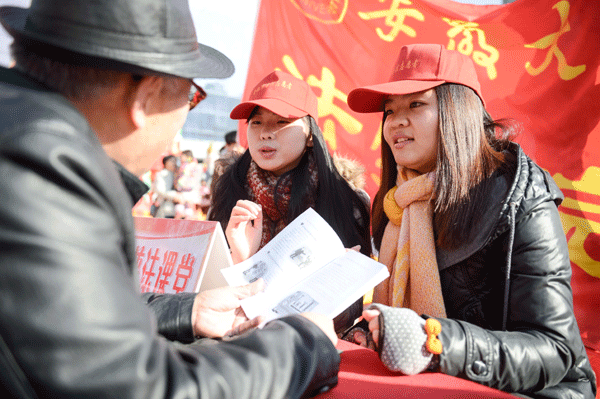Nation's top judge calls for courts to live up to people's trust
|
 Students from the Law School at Anhui University provide legal advice to people on Thursday, the country's first Constitution Day. Zhang Duan / Xinhua |
All courts and judges must respect the Constitution and uphold its importance and the rule of law, China's top judge said on Thursday.
Supreme People's Court President Zhou Qiang made the remarks during celebration activities to mark the nation's first Constitution Day.
All Chinese judges should abide by the Constitution, the fundamental law in China, Zhou said. They must protect its authority and ensure it is applied when they hear cases, he said.
Zhou said that judges must deal with their cases independently, respect and protect human rights, punish wrongdoers, crack down on crime and keep the nation safe under the Constitution.
"It's the first Constitution Day in China, and I'd like to shoulder the responsibility with the more than 330,000 judges across the country to protect people's interests and live up to their great trust," he said.
As courts push forward judicial reform, they should also maintain justice and have public supervision, which is required under the Constitution, Zhou said, adding that the top court will further improve its transparency.
He highlighted the importance of avoiding wrongful convictions in trials, asking judges to stick to this principle.
Zhang Hui and his uncle Zhang Gaoping, two men wrongly convicted in a rape case, were also invited to the top court on Thursday. Sun Jungong, the top court's spokesman, said they "can be the proof that our courts are determined to protect everyone's rights and obtain justice."
Ten years ago, Zhang Hui and Zhang Gaoping were tried on charges of raping a 17-year-old girl. Despite a lack of physical evidence, Zhang Hui was sentenced to life in prison and Zhang Gaoping was sentenced to 15 years.
Activities to commemorate the enactment of the fourth version of China's Constitution, which was issued on Dec 4, 1982, were held across the nation.
Guo Jie, a juvenile court judge in Fujian province, went to schools to share legal knowledge on Thursday, saying she wanted to put into practice the protection of young people that is promised in the Constitution.
"The Constitution is our basic standard in hearing juvenile disputes. But sometimes we pay more attention to specific laws instead of the fundamental law," Guo said, adding that Constitution Day is making her review legal principles and share them with juveniles.
Zhang Dejiang, China's top legislator, also promoted education about the Constitution on Wednesday.
When the Fourth Plenum of the 18th Central Committee of the Communist Party of China was held in October, a "socialist State of rule of law" was the major topic, and still being discussed by the public.
Cheng Lei, an associate law professor at Renmin University of China, said upholding the authority of the Constitution is not only the responsibility of judicial workers, but citizens as well.
"The public should understand the Constitution, supervising government department's work and problems in other laws. Only in this way can we control power and better protect people's interests and rights," he said.
